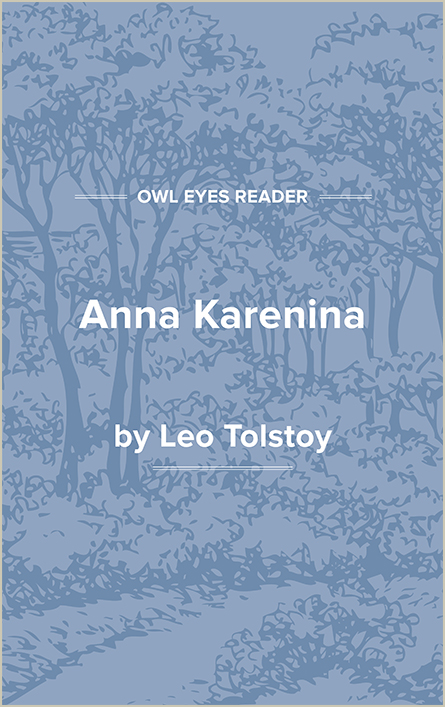Study Guide
Summary
The source of Tolstoy’s next great novel, Anna Karenina, lies in an idea that he conveyed to his wife in 1870. He wanted to write a story about a married woman who is disgraced by a sexual scandal. He would depict her “not as culpable, but as uniquely worthy of pity.” This story he knew from his own family: his only sister, Marya, had recently left her husband for an adulterous liaison with a Swedish viscount. Two years later, he saw firsthand the potential disastrous results of such a passion. One of his neighbors cast off his mistress, Anna Stepanovna Pirogova, who then threw herself under a train. Tolstoy viewed her remains afterward. Within the year, he began writing Anna Karenina. He was stimulated further by his reading of Alexander Pushkin’s Povesti Belkina (1831; Russian Romance, 1875), which he admired. He was struck by the phrase, “The guests were arriving at the country house,” and began to write his story around it.
Anna Karenina begins with the oft-quoted line, “Happy families are all alike; every unhappy family is unhappy in its own way.” In this novel, Tolstoy portrays both a happy and an unhappy family. The happy Constantine Levin and his wife, Kitty, resemble Pierre and Natasha Bezukhov in War and Peace because of their positive attitudes in the face of adversity and their compassion toward other people. Levin and Kitty’s rapport is such that Levin exclaims that he does “not know where she ended and he began.”
The marriage of Alexey and Anna Karenin, on the other hand, is a loveless match held in place by the dictates of society. When Anna meets a dashing officer of the guards, Alexey Vronsky, she readily abandons her husband and son for the sake of illicit passion. Far from being an ennobling force, Anna and Vronsky’s love leads to chaos, ruin, and, eventually, Anna’s death under the wheels of an oncoming train.
Throughout the novel, the characters of Anna and Levin are compared and contrasted. Distantly related through marriage (Anna’s brother is married to Kitty’s sister), they make life choices that are diametrically opposed to each other. Anna is a young, beautiful, intelligent, vital woman who inexplicably and single-mindedly chooses to destroy herself. After discovering that Anna is in love with Vronsky, Anna’s husband suggests a divorce. Yet Anna rejects his offer by saying that she does not want a divorce if it is the result of “his generosity.” Vronsky, too, is willing to accommodate her by taking her away from Moscow and marrying her, yet she once again refuses to finalize the divorce. Instead, she torments him with her possessiveness and fits of jealousy. Her last words before she throws herself under the train reflect her vindictive frame of mind against Vronsky: “I will punish him and escape from everyone and from myself.”
The origins of Anna’s self-destructive nature are not clear—though, in truth, Anna has what is now called an addictive personality. She demands more and more of Vronsky’s love because she can never believe that he truly cares for her. Even when he abandons his career to spend more time with her, she still cries out for more attention. Anna accurately describes the state of their interaction by saying, “My love keeps growing more passionate and egoistic, while his is waning and waning.” Their relationship cannot grow in this type of environment, nor does it nourish them at all as individuals. Some critics point out that it is Anna’s unbridled sexuality that corrupts her. Edward Wasiolek in Tolstoy’s Major Fiction
(The entire page is 916 words.)
Owl Eyes subscribers get unlimited access to our expert annotations, analyses, and study guides on your favorite texts. Master the classics for less than $5/month!

